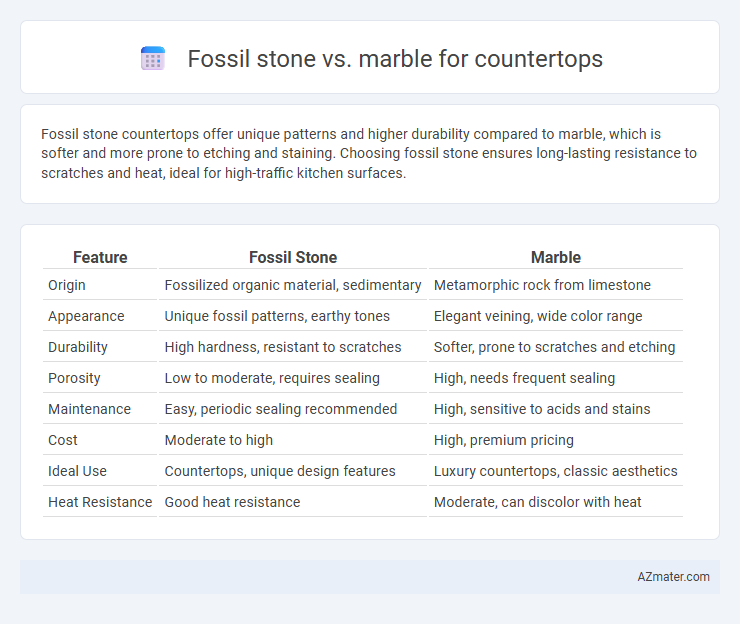Fossil stone countertops offer unique patterns and higher durability compared to marble, which is softer and more prone to etching and staining. Choosing fossil stone ensures long-lasting resistance to scratches and heat, ideal for high-traffic kitchen surfaces.
Table of Comparison
| Feature | Fossil Stone | Marble |
|---|---|---|
| Origin | Fossilized organic material, sedimentary | Metamorphic rock from limestone |
| Appearance | Unique fossil patterns, earthy tones | Elegant veining, wide color range |
| Durability | High hardness, resistant to scratches | Softer, prone to scratches and etching |
| Porosity | Low to moderate, requires sealing | High, needs frequent sealing |
| Maintenance | Easy, periodic sealing recommended | High, sensitive to acids and stains |
| Cost | Moderate to high | High, premium pricing |
| Ideal Use | Countertops, unique design features | Luxury countertops, classic aesthetics |
| Heat Resistance | Good heat resistance | Moderate, can discolor with heat |
Overview: Fossil Stone vs Marble Countertops
Fossil stone countertops feature unique, naturally embedded fossil patterns that add distinct character and organic beauty to kitchen and bathroom surfaces. Marble countertops are prized for their classic elegance, with smooth, polished surfaces and veining patterns that enhance luxury interior designs. Both materials offer durability, but fossil stone tends to resist scratches and stains better, while marble requires more maintenance due to its porous nature.
Composition and Origins
Fossil stone countertops consist primarily of compressed organic materials, such as ancient marine fossils embedded in sedimentary rock formed millions of years ago, offering unique patterns and natural history appeal. Marble countertops derive from metamorphic limestone composed mainly of calcite, formed deep within the Earth's crust through heat and pressure, known for its crystalline veining and luxurious aesthetic. The origin differences impact durability and appearance, with fossil stone emphasizing geological heritage, while marble highlights classic elegance sourced from regions like Carrara, Italy.
Appearance and Aesthetic Differences
Fossil stone countertops showcase unique, natural patterns with embedded ancient shells and organic shapes, offering a distinctive, textured appearance that stands out as a conversation piece. Marble countertops provide a classic, elegant aesthetic characterized by smooth surfaces and flowing veining in shades of white, gray, or black, creating a timeless and luxurious look. The fossil stone's earthy tones and intricate designs contrast with marble's refined, polished finish, catering to different interior styles and personal tastes.
Durability and Strength Comparison
Fossil stone countertops offer exceptional durability due to their dense composition of ancient marine fossils embedded in natural stone, making them highly resistant to scratches and heat. Marble, while renowned for its elegant appearance, is softer and more porous, leading to greater susceptibility to scratches, stains, and etching from acidic substances. For strength, fossil stone generally outperforms marble in hardness and structural integrity, providing a long-lasting surface ideal for high-traffic kitchen use.
Maintenance Requirements
Fossil stone countertops require minimal maintenance due to their natural durability and resistance to staining, making them ideal for busy kitchens. Marble countertops, while luxurious, demand frequent sealing and careful cleaning to prevent etching and staining from acidic substances. Choosing fossil stone reduces the risk of damage and lowers the time and cost invested in upkeep compared to marble.
Stain and Scratch Resistance
Fossil stone countertops offer superior stain resistance due to their dense, non-porous surface, reducing the risk of absorbing spills compared to marble. Marble is more prone to staining from acidic substances and requires regular sealing to maintain its appearance. In terms of scratch resistance, fossil stone is harder and less susceptible to scratches, making it a more durable option for high-traffic kitchen areas.
Cost Analysis: Fossil Stone vs Marble
Fossil stone countertops typically cost between $60 and $100 per square foot, making them a more budget-friendly option compared to marble, which ranges from $75 to $250 per square foot depending on the grade and origin. Marble's higher price reflects its natural veining and rarity, while fossil stone offers unique fossilized patterns at a lower cost without compromising durability. Installation and maintenance expenses are generally comparable, but fossil stone may require less frequent sealing, contributing to long-term savings.
Environmental Impact and Sustainability
Fossil stone countertops, composed mainly of compressed natural sediments, generally have a lower environmental impact due to less intensive extraction processes compared to marble, which involves quarrying that disrupts ecosystems and generates significant waste. Fossil stone's durability and resistance to wear reduce the need for frequent replacement, enhancing long-term sustainability. Marble, while offering classic aesthetic appeal, requires more energy-intensive processing and maintenance, often resulting in a larger carbon footprint over its lifecycle.
Best Applications in Home Design
Fossil stone countertops excel in creating unique, natural focal points in kitchens and bathrooms due to their striking fossil patterns and durability, making them ideal for rustic or eclectic design styles. Marble countertops offer classic elegance and a smooth, cool surface perfect for baking areas and formal kitchens, favored in traditional and modern luxury interiors. Both materials are heat-resistant but require different maintenance levels, with fossil stone being more scratch-resistant and marble needing periodic sealing to prevent staining.
Pros and Cons: Which Countertop is Better?
Fossil stone countertops offer unique, natural patterns with exceptional durability and resistance to heat and scratches, making them a practical choice for busy kitchens. Marble provides a timeless, elegant aesthetic with cool surface properties ideal for baking, but it is prone to staining, etching, and requires regular sealing for maintenance. Choosing between fossil stone and marble depends on whether durability and low maintenance or classic beauty and luxury take precedence in your countertop selection.

Infographic: Fossil stone vs Marble for Countertop
 azmater.com
azmater.com